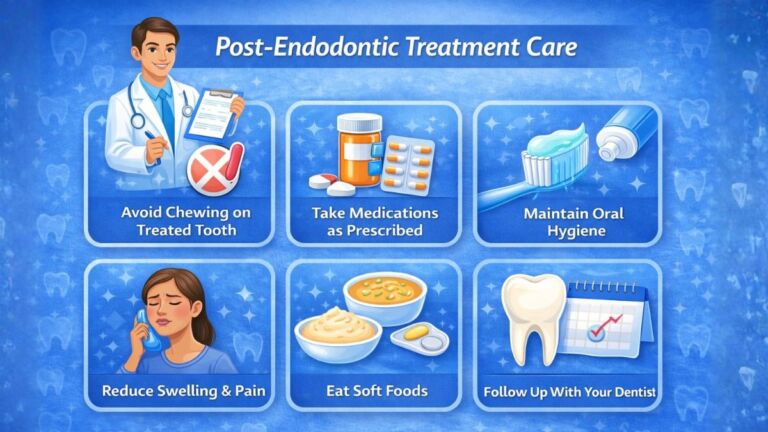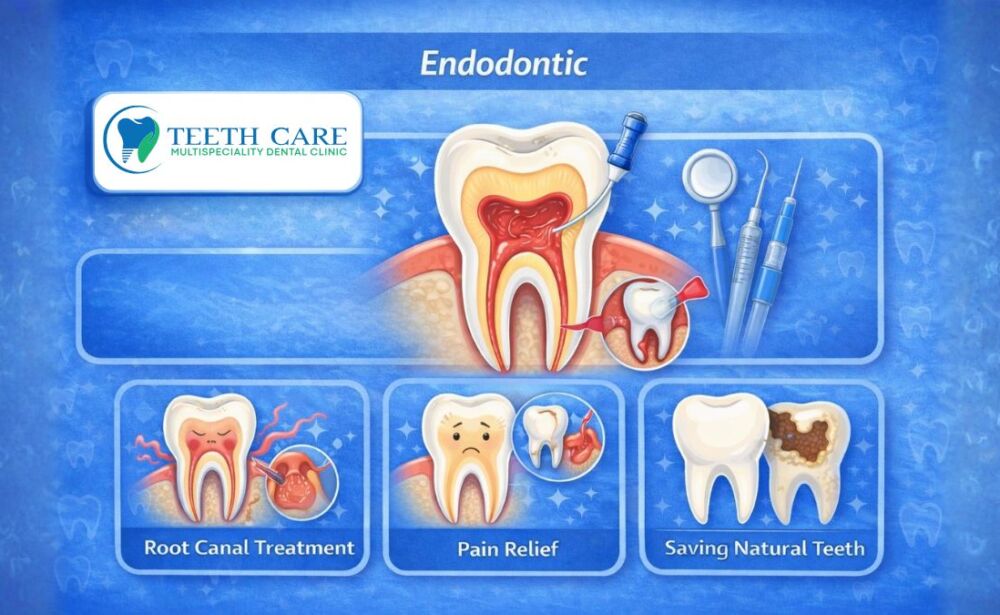Advanced Root Canal Care by an Experienced Endodontist in Kolkata
At Teeth Care Multispeciality Dental Clinic, we specialize in endodontic treatment in Kolkata that focuses on saving natural teeth and eliminating deep-root infections. Our highly trained endodontists in Kolkata use modern technology and precise techniques to deliver predictable, pain-free root canal outcomes.
If you are searching for a trusted endodontist in Kolkata, our clinic offers advanced care with transparent pricing and patient-first treatment planning.

What is Endodontics?
Endodontic treatment in Kolkata refers to specialized procedures that treat infection inside the tooth, specifically within the pulp and root canal system. When deep decay or trauma reaches the nerve, routine fillings are no longer effective.
In such cases, endodontic treatment in Kolkata helps remove the infection, disinfect the canals, and restore the tooth so it continues to function normally within the bite.
Why You May Need Endodontic Treatment in Kolkata
Dental pulp infections progress silently and often become severe before symptoms appear. Consulting an experienced endodontist in Kolkata at the right time prevents infection from spreading to the jawbone or adjacent teeth.
Many patients who delay care eventually require tooth replacement procedures such as tooth replacement options, which are more invasive than timely endodontic care.

Common Symptoms That Require an Endodontist
These symptoms strongly indicate the need for endodontic treatment in Kolkata by a specialist.
- Persistent or severe tooth pain
- Sensitivity to hot or cold that lingers
- Swelling or pus near the gums
- Pain while chewing or biting
- Tooth discoloration
Benefits of Timely Endodontic Treatment
Early care by a qualified endodontist in Kolkata improves success rates and prevents unnecessary tooth loss.
- Immediate pain relief
- Complete infection removal
- Preservation of natural teeth
- Prevention of bone damage
- Avoidance of tooth extraction

Types of Endodontic Treatment in Kolkata We Offer
At our clinic, endodontic treatment in Kolkata is planned based on canal anatomy, infection depth, and overall oral health.
Single-Visit Root Canal Treatment
This type of endodontic treatment in Kolkata is suitable for straightforward cases where infection is limited.
- One-visit completion
- Faster recovery
- Reduced chair time
Patients often combine this treatment with general dentistry services for long-term preventive care.
Multi-Canal Root Canal Treatment (Molars & Premolars)
Molars require advanced expertise due to complex canal systems. A skilled endodontist in Kolkata ensures all canals are treated thoroughly.
- Treatment of multiple canals
- Rotary endodontic systems
- Higher long-term success
Root Canal Retreatment
Failed or reinfected root canals can often be saved with retreatment by an experienced endodontist in Kolkata.
- Removal of old filling material
- Re-disinfection of canals
- Avoidance of extraction
If retreatment is not feasible, patients may be guided toward dental implant treatment as a secondary option.
Endodontic Surgery (Apicoectomy)
This advanced endodontic treatment in Kolkata is used when infection persists near the root tip.
- Surgical removal of infection
- Root-end sealing
- Long-term infection control
Vital Pulp Therapy
This conservative endodontic treatment in Kolkata is ideal when pulp damage is minimal and reversible.
- Preserves tooth vitality
- Minimally invasive
- Prevents full root canal treatment
Why Endodontic Treatment is Important?
- Saves natural teeth from extraction
- Relieves severe tooth pain caused by infection or decay
- Prevents spread of infection to surrounding teeth and gums
- Maintains natural chewing and biting function
- Preserves the aesthetic appearance of your smile
Comparison of Endodontic Treatments
| Type | Purpose | Best For | Number of Visits | Invasiveness | Benefits |
| Single Tooth Root Canal | Remove infection from one tooth’s pulp | Decayed or infected single teeth | 1–2 visits | Minimally invasive | Saves natural tooth, relieves pain, restores function |
| Multiple Root Canal (Molars/Premolars) | Treat teeth with multiple canals | Molars/premolars with complex anatomy | 2–3 visits | Minimally to moderately invasive | Thorough cleaning of all canals, preserves chewing efficiency |
| Root Canal Retreatment | Re-treat failed previous root canal | Previously treated tooth with reinfection | 2–4 visits | Moderately invasive | Removes infection, preserves tooth, avoids extraction |
| Endodontic Surgery (Apicoectomy) | Surgical removal of infection at root tip | Persistent infection after conventional root canal | 1–2 visits | Invasive | Resolves infection, preserves tooth that cannot be treated conventionally |
| Pulp Capping / Vital Pulp Therapy | Preserve healthy pulp & stimulate healing | Deep cavities without full pulp infection | 1 visit | Minimally invasive | Maintains tooth vitality, avoids full root canal |
Endodontic Treatment Procedure Step by Step
| Step | Procedure | Purpose |
| Diagnosis | Digital X-ray | Identify infection |
| Anesthesia | Local numbing | Pain-free care |
| Pulp removal | Infected tissue removed | Stop infection |
| Canal cleaning | Rotary instruments | Disinfection |
| Canal sealing | Biocompatible filling | Prevent reinfection |
| Restoration | Filling or crown | Tooth protection |
Root Canal Treatment Cost in Kolkata
| Endodontic Treatment Type | Cost |
| Root canal with metal crown | ₹6,500 |
| Root canal with metal-ceramic crown | ₹8,500 |
| Root canal with zirconia crown | ₹14,000 |
Why Choose Our Endodontist in Kolkata?
| Advantage | Benefit |
| Specialist endodontists | Higher success |
| Digital diagnostics | Accurate care |
| Rotary endodontics | Faster healing |
| Sterile protocols | Safe treatment |
| Transparent pricing | No surprises |
Post-Endodontic Treatment Care

Proper aftercare supports healing and long-term success.
- Avoid hard foods initially
- Maintain oral hygiene
- Attend follow-up visits
- Contact your endodontist in Kolkata if discomfort persists
FAQ
When should I consult an endodontist in Kolkata?
If you experience persistent pain, swelling, or sensitivity, consult an endodontist in Kolkata without delay.
How many visits are needed for endodontic treatment in Kolkata?
Most cases are completed in one or two visits.
Is a crown necessary after endodontic treatment in Kolkata?
Yes. Crowns protect treated teeth and extend their lifespan.
Can endodontic treatment in Kolkata save badly infected teeth?
Yes. Advanced techniques allow many severely infected teeth to be preserved.
Is Endodontic Treatment Painful?
Modern endodontic treatment in Kolkata is designed to relieve pain. Most patients feel comfortable during the procedure and experience relief shortly after.
How Long Does Endodontic Treatment Last?
When performed by an experienced endodontist in Kolkata and protected with a crown, a treated tooth can last for decades with proper oral care.
How do I know if I need a root canal?
Common signs include severe toothache, sensitivity to hot or cold, swelling, or discoloration of a tooth.
Is root canal treatment painful?
Modern anesthesia and techniques make the procedure virtually painless. Mild discomfort may occur post-treatment.
How long does endodontic treatment take?
Single tooth treatments may take 1–2 visits. Complex molars or retreatments may require additional appointments.
Will my tooth need a crown after treatment?
Most treated teeth are restored with a crown to strengthen and protect them.
Can a tooth be saved if the pulp is infected?
Yes. Endodontic procedures are designed to remove infection and preserve the natural tooth whenever possible.
